You might have noticed that all the Minor Pieces to date have featured gentlemen. The main reason, I suppose, is that most of them have been about members of early chess clubs in the Richmond and Twickenham area which specifically advertised as being for gentlemen. No ladies, and certainly no plebs.
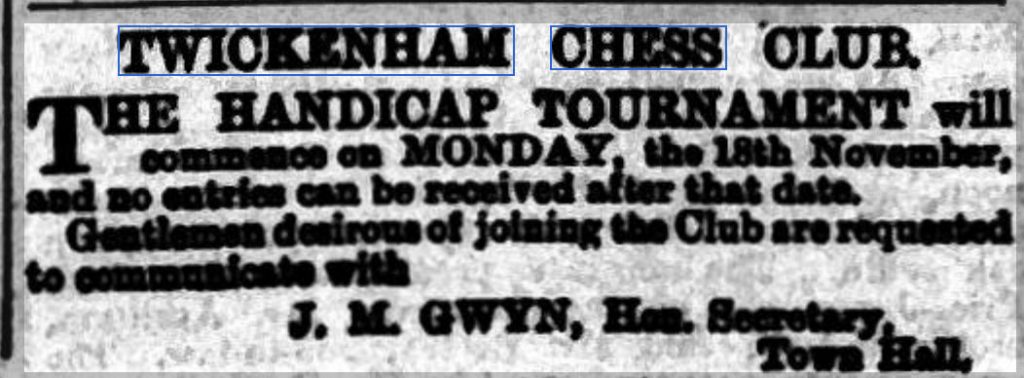
Here’s Twickenham Chess Club, for example, although a slightly later report of a Richmond Chess Club AGM mentioned that they had a couple of lady members: seemingly social rather than match players.
But there was also a very popular and successful Ladies Chess Club founded in London in 1895. We’ll meet some of their members in future articles. In 1904 the first British Championships incorporated a Ladies Championship. It’s clear that round about 1900, although the majority of competitive players were, just as today, male, chess for ladies was also thriving. It will be interesting to find out who they were and how (and why) they played the game of queens as well as kings.
But first you might have spotted one of PGL Fothergill’s Staines and Ashford teammates in a recent article.
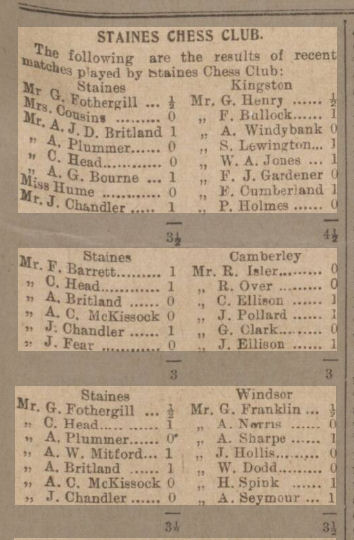
The Staines team playing Kingston featured not just Mrs Cousins but Miss Hume as well.
She was still playing after the First World War, when Staines had possibly been renamed Ashford and District.
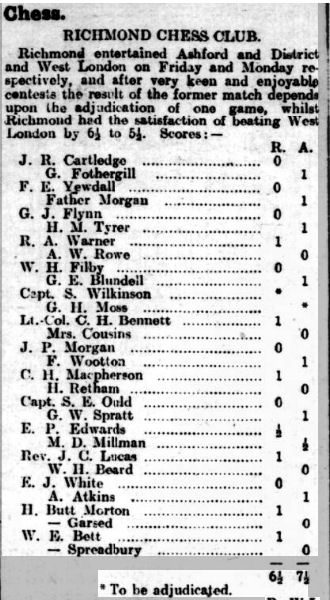
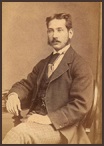
Lieutenant-Colonel Charles Henry Bennett (1853-1925) had been born in Cork and spent his career in the Indian Army Medical Service, also serving in Afghanistan. His gallantry didn’t extend to letting his lady opponent win the game.
So, who was Mrs Cousins and what was she doing in a man’s – sorry, gentleman’s – world?
She was born Jessie Helena Hume in St Marylebone on 28 June 1866, so she was in her 40s and 50s when playing in these matches. Her father, Charles Dobinson Hume, was a clerk working for the local government board, whose work involved with the Poor Law would take him to Ashford, Middlesex. Her mother, presumably, was Catherine Austen Mary Bailey, whose second name suggests her parents may have been Janeites. Although Jessie’s birth was registered (as Jessie Helen) with the surname Hume and mother’s maiden name Bailey, her parents weren’t married at the time, and were living separately in 1871, Charles with his parents and Catherine working as a bookkeeper, described as a servant to an accountant. They only married – in Richmond – in 1872 (with Catherine’s name given as Kate), at which time they moved to Ashford. I haven’t yet been able to locate Jessie in the 1871 census as either Hume or Bailey – she may well have been living with relations. Once Charles and Kate had tied the knot, four more daughters arrived: Mabel in 1874, twins Edith and Sophia in 1876 and finally Isabel in 1877.
I can’t find any immediate connection with the Scottish born problemist George Hume.
I presume Jessie learnt chess from her father, although he doesn’t seem to have been a competitive player. Miss Hume in 1914 would have been one of her sisters: Sophia had married by this point, but Mabel, Edith and Isabel were all unmarried and living at home with their widowed mother, so it might have been any of them. It’s both strange and annoying that, in those days, ladies’ names were given only with a title, not an initial.
Jessie had married Thomas George Cousins in Staines in 1893: they went on to have five children between 1895 and 1909: Dorothy, Sydney, Lillian, Dennis and Margaret. Thomas would have known his father-in-law through work: he was the Relieving Officer for the Guardians of the Poor of Staines Union – the workhouse. His job would have involved assessing the needs of the poor in the area and providing for them to the best of his ability.
At some point she took up correspondence chess. Thanks to Gerard Killoran for sending me this game, taken from the Weekly Irish Times (21 August 1909). Her opponent appears to have been Arthur Patrick Morgan (1864-1918), a school inspector. Jessie played the first part of the game very well, but unfortunately missed the opportunity to win the exchange on move 35. The newspaper commented: A well played game by “one of the gentler sex”. All through most interesting, but Mr Morgan had the most experience. The ending is rather unexpected. Click on any move for a pop-up window.
It’s not yet clear when Staines Chess Club was founded. I can’t find any earlier mentions than this 1913 match against Windsor, but it’s quite possible the relevant local newspapers aren’t yet available online.
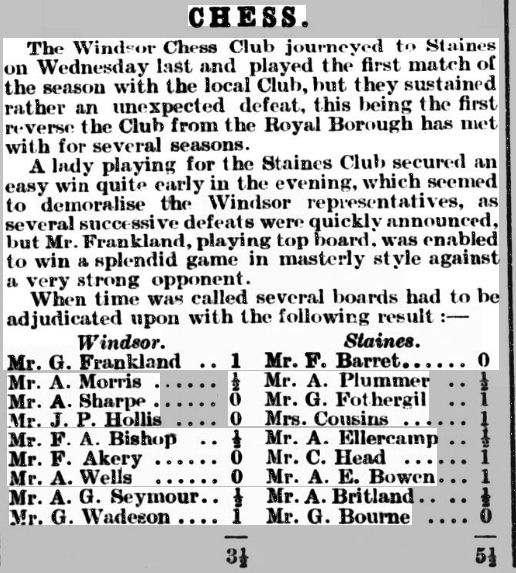
Today, I’d imagine a female chess player would feel insulted and patronised to be discussed in that way, but I suspect that, in those very different times, Mrs Cousins was more likely to have been flattered and amused.
The selectors must have been impressed with her speedy victory, as, a few months later, she was promoted to top board in this match against Thames Valley.
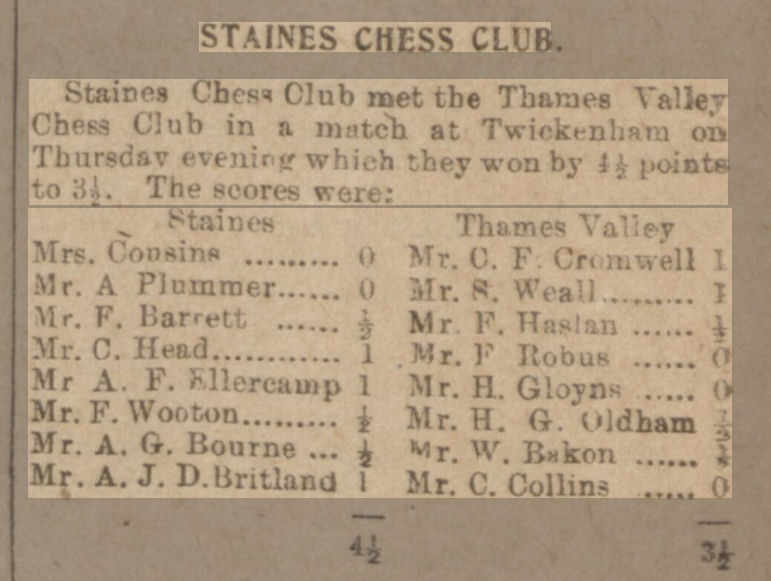
CF Cromwell must have been a misprint for Cecil Frank Cornwall: he was a pretty strong player so it was no disgrace to lose to him.
Just as Richmond Chess Club staged matches between the residents of Richmond and Sheen, so Staines (now Staines and District) Chess Club staged matches between the residents of Staines and Ashford. In this wartime match, Jessie’s sister (the same one as above?) and husband were both successful. Did she, I wonder, teach her husband how to play?
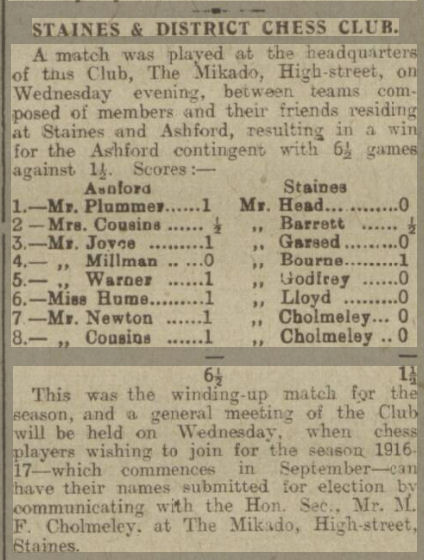
Their Club Secretary, Montague Francis Cholmeley, from the family of the Cholmeley Baronets, don’t you know, was born in what was then Madras in 1856 and died in Staines in 1944. Not many people outside the area know that Staines was the home of linoleum for more than a century from its invention in 1860, and the Staines Linoleum Company employed Monty, a solicitor, to deal with their legal affairs. I’m not sure who the other Mr Cholmeley was. His only brother was in India. It might, I suppose, have been his son Humphrey Jasper, home on leave from the trenches, where, on 15 July the same year, he tragically lost his life in the Battle of the Somme. I assume the Mikado was a restaurant: it would have been a very short walk from where, a few years later, the Misses Ada and Louisa Padbury would be juggling running their own restaurant with bringing up their young niece. Yes, you’ve heard the story before, and you’ll hear it again as well.
I’d imagine, then, that at some point fairly soon after this match the club moved down the road to Ashford, the home town of its stronger members, changing its name in the process, taking us to 1921, when we saw Jessie Cousins playing in a match against Richmond.
Also in 1921 she played on board 183 for the North of the Thames in a 400 board megamatch against the South of the Thames: you can see the full score here. You’ll note that the two players immedately above here were Staines/Ashford colleagues. There are some great names on both sides in this match, including the subject of the next Minor Piece. I should perhaps look in more detail another time: meanwhile there’s some background information here.
Richmond, as we’ll see, faced competition in the area from new clubs in Twickenham (you’ll recall the previous Twickenham club had moved to Teddington and changed its name to Thames Valley), Barnes and Kew. I’ll tell you more about the Barnes Village chess club next time, but in the inter-war years they played regular matches against Ashford.
This, from 1929, is the last mention of Mrs Cousins I’ve been able to find.
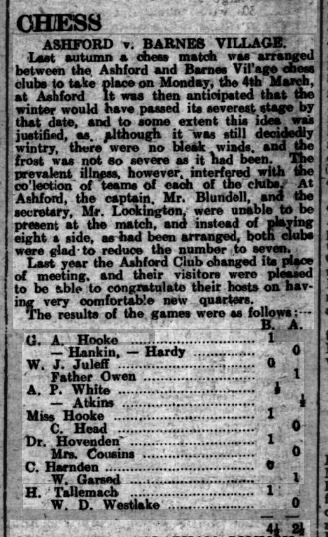
You’ll see that both teams fielded a lady, and they just missed each other by one board: Miss Hooke (in 1929 ladies were still not allowed initials) was playing for Barnes Village along with GA Hooke. You’ll find out more about the Hooke family very soon.
The 1939 Register records Thomas, Jessie and their unmarried daughter Dorothy living at 18 Fordbridge Road, Ashford, Middlesex, which is where Jessie died on 23 August 1948 at the age of 82. I haven’t found any records of any of her children playing competitive chess.
Jessie Helena (Hume) Cousins was a lady who, for almost two decades, was successful in the, then as now, male dominated world of suburban competitive chess. She was clearly a more than competent player as well, probably around 1800 strength by today’s standards. Her story should be an inspiration for any girls and women wanting to take up competitive chess today.
